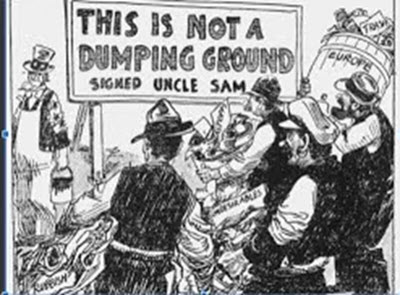Necessary Fictions

Every founding myth, great or small, must be told from the perspective which evokes emotions and thoughts in the listeners’ mind of belonging to divinely constructed polity. The founding fathers were clearly flawed, but we are told that they performed miracles which led to the formation of a uniquely free society. The use of religious references is appropriate as it not only suggests that the founding fathers were ordained by God, but also that they were fated by their own powerful wills and fertile visions of the future to remake this vast land into a new and better nation, an indispensible nation to quote Hillary Clinton. The usefulness of this meaning in our modern era is difficult to apprehend for the opponents of this founding myth, which they find impossible to deconstruct into its constituent parts rendering them unable to grasp its basic function. The essential purpose of this myth is to produce a coherent explanation, wherein the common minds weaves narratives of belonging to a unique but embattled culture engendering feelings of a cultural commonsense which facilitates the transfer of ideas, and historical facts, which bind each proper member of the society to another. Historical “facts”, if indeed they possess an objective existence, are necessarily distorted by the mind that engages these facts in order to produce meaning. This is the common ground over which any analysis or critical thinking must occur. Thus the battle over critical thinking is really a fight over the narrative that defines the nation, its proper members and its ultimate purpose. Educators need to understand this and find useful ways to incorporate the founding myths in order to shape them for their own ends.
Daniel Willingham defines critical thinking as “seeing both sides of an issue, being open to new evidence that disconfirms your ideas, reasoning dispassionately, demanding that claims be backed by evidence, deducing and inferring conclusions from available facts, solving problems.” For any group of people trying to maintain a particular way of life, critical thinking can feel subversive, especially if this way of life appears to be slipping away. The Republican party of Texas linked the teaching of critical thinking with what it called Outcome-Based Education (OBE), which is defined as education that focuses on behavior modification, the sole purpose of which is to challenge the student’s fixed beliefs and undermining parental authority. What are these fixed beliefs? Whatever they are, it is the notion that they are fixed is what is essential. These fixed beliefs impose the proper shape (as far as the party is concerned) and structure on society. We may accept that there are no a priori concepts existing independently in the external world awaiting our discovery, but this is a bitter pill to swallow and outright heresy to champions of fixed beliefs. Educators are necessarily depicted as completely out of touch with reality (as constructed by pre-existing fixed beliefs) of the common man.
None of us are immune from a certain amount of groupthink whenever we are confronted with the possibility of being overrun by ‘others’. The Eugenics movement in the United States gained mass support in the early 20th century in response to increased immigration from southern and eastern Europe. One of the major successes of the Eugenics movement occurred in 1924 when an association of interested parties in eugenics passed the National Origins Act (the Immigration Act of 1924) which limited immigrants that were deemed inferior to the Anglo-Saxon race (which, although historically inaccurate, to this day is believed to be the original colonizers of the Americas). Among the rank and file and the leading lights of society, irrespective of their political orientation, the ‘fact’ that Anglo-Saxon race was in danger of being diluted was widely accepted. The large numbers Italian and Jewish migrants from Southern and Eastern Europe respectively fueled an existential angst that made it easy to accept the pseudo-scientific theories upon which eugenics was based.

One of the early success of the Eugenics movement was the National Origins Act1 Donald Trump is widely regarded among ‘well-thinking’ people as a demagogue spewing hate, yet nothing he has said is as pernicious as the ideas promulgated (such as the forced sterilization of thousands of poor women) and ultimately carried out by proponents the Eugenics movement. The eugenics laws enacted in many States became an exemplar for the Nazis who eventually copied and adapted to them to their nefarious purposes. Much ink had been spilled by liberal thinkers (such as Margaret Sanger, founder of Planned Parenthood, and Oliver Wendell Holmes, a Supreme Court justice) in support of eugenics before the advent of the atrocities of the Second World War. Under any perceived threat of dissolution, critical thinking is near well impossible as myths are drafted and pressed into service as frontline scientific facts.
The success of capitalism seems preordained as we in the West, appear to be vanquishing poverty by leaps and bounds with ever increasing technological sophistication. Beneath this appearance of ever increasing technological advancement lives the pre-eminent intellectual attitude that insight into our world, whether natural or socially constructed, is inevitable with systematic study. But people in the United States are impatient with deliberative processes, and as a mass tend to be easily manipulated on a non-rational level. Scientific ideas (in a vague, magical sort of way) are most easily visible to the populace via consumption of modern manufactured products. Yet liberal ideas about education are less successful outside of academia because they do not seem relevant to the lives of ordinary people. Our social constructs are largely responsible for the dismal state of education. Whenever I tell someone that I study mathematics, I invariably get the accusatory response “What’s it good for?” I usually construct some unrealistic but impressive sounding applications in order to assuage my accuser and convince him or her that my time thinking yields tangible profits. Every category of academic study is subject to some variation of that question. The model of education as the process of acquiring the habit of a reflective mind, wherein one possesses the faculty of critical thought, and the promotion of a lifelong curiosity is being actively diminished in our goal centered society. Therein lays the real and sustained attack on critical thinking. Palpable, demonstrable rewards must be had for any effort to be engaged with enthusiasm. This is a significant obstacle in the way of education and arguably leads to intellectual poverty. The problem of education is thus largely one of poverty. Not material poverty, which capitalism is busy vanquishing, but rather a kind of poverty of the mind in which one accepts “facts” uncritically.
To be successful educators cannot deride the ‘irrational’ beliefs of their students (whether it’s the denial of human driven climate change or the rejection of the theory of evolution in favor of creationism) but instead they should adapt them to a new purpose. To fully insinuate oneself into the attitude of mind of the intended audience, emotional appeals are necessary, linking modern ideas with the very survival of the nation. Educators should accept that the classroom has lost its protected status. It is no longer a space where ideas are examined dispassionately and perhaps it never was. Suspicions abound that the classroom is really a factory to produce minds bent upon the destruction of the way things are supposed to be. This undermining of the putative proper order is believed to be carried out by educators who employ the twin tools of multiculturalism and revisionist history. These are real fears amplified by economic hardships and a feeling of being left behind which shrewd politicians deftly exploit. Educators must be equally shrewd and seek to craft the necessary fictions that will transport young minds into the world of modern ideas.
Footnotes
© 2022 Langstrom Blog
Build with Astro
Sarissa theme desing by iozcelik
